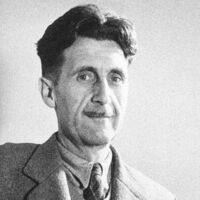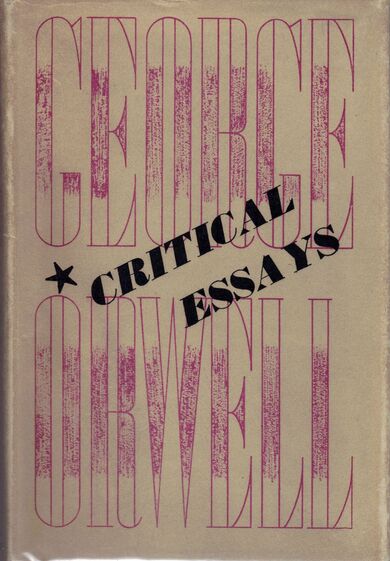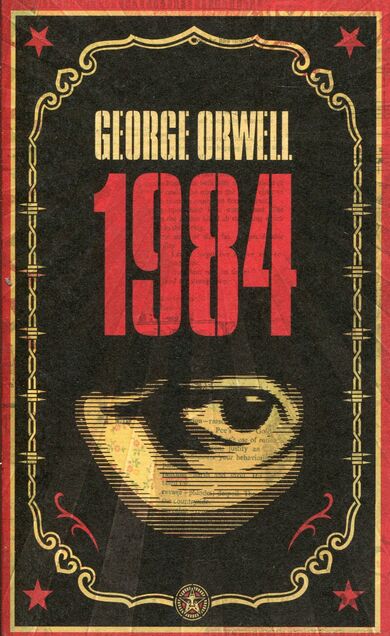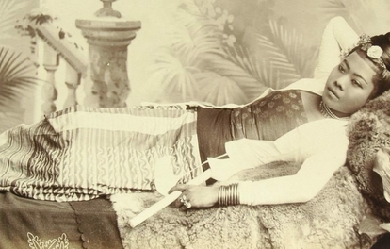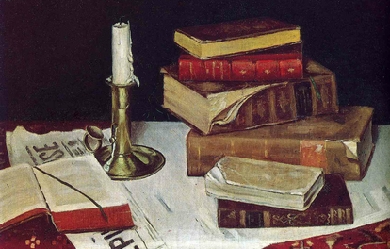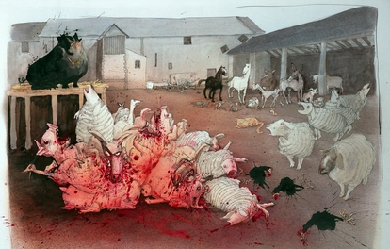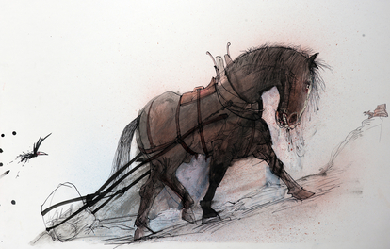
Arthur Koestler
One striking fact about English literature during the present century is the extent to which it has been dominated by foreigners—for example, Conrad, Henry James, Shaw, Joyce, Yeats, Pound and Eliot. Still, if you chose to make this a matter of national prestige and examine our achievement in the various branches of literature, you would find that England made a fairly good showing until you came to what may be roughly described as political writing, or pamphleteering. I mean by this the special class of literature that has arisen out of the European political struggle since the rise of Fascism. Under this heading novels, autobiographies, books of “reportage”, sociological treatises and plain pamphlets can all be lumped together, all of them having a common origin and to a great extent the same emotional atmosphere.
Some out of the outstanding figures in this school of writers are Silone, Malraux, Salvemini, Borkenau, Victor Serge and Koestler himself. Some of these are imaginative writers, some not, but they are all alike in that they are trying to write contemporary history, but unofficial history, the kind that is ignored in the text-books and lied about in the newspapers. Also they are all alike in being continental Europeans. It may be an exaggeration, but it cannot be a very great one, to say that whenever a book dealing with totalitarianism appears in this country, and still seems worth reading six months after publication, it is a book translated from some foreign language. English writers, over the past dozen years, have poured forth an enormous spate of political literature, but they have produced almost nothing of aesthetic value, and very little of historical value either. The Left Book Club, for instance, has been running ever since 1936. How many of its chosen volumes can you even remember the names of? Nazi Germany, Soviet Russia, Spain, Abyssinia, Austria, Czechoslovakia—all that these and kindred subjects have produced, in England, are slick books of reportage, dishonest pamphlets in which propaganda is swallowed whole and then spewed up again, half digested, and a very few reliable guide books and text-books. There has been nothing resembling, for instance, Fontamara or Darkness at Noon, because there is almost no English writer to whom it has happened to see totalitarianism from the inside. In Europe, during the past decade and more, things have been happening to middle-class people which in England do not even happen to the working class. Most of the European writers I mentioned above, and scores of others like them, have been obliged to break the law in order to engage in politics at all; some of them have thrown bombs and fought in street battles, many have been in prison or the concentration camp, or fled across frontiers with false names and forged passports. One cannot imagine, say, Professor Laski indulging in activities of that kind. England is lacking, therefore, in what one might call concentration-camp literature. The special world created by secret-police forces, censorship of opinion, torture and frame-up trials is, of course, known about and to some extent disapproved of, but it has made very little emotional impact. One result of this is that there exists in England almost no literature of disillusionment about the Soviet Union. There is the attitude of ignorant disapproval, and there is the attitude of uncritical admiration, but very little in between. Opinion on the Moscow sabotage trials, for instance, was divided, but divided chiefly on the question of whether the accused were guilty. Few people were able to see that, whether justified or not, the trials were an unspeakable horror. And English disapproval of the Nazi outrages has also been an unreal thing, turned on and off like a tap according to political expediency. To understand such things one has to be able to imagine oneself as the victim, and for an Englishman to write Darkness at Noon would be as unlikely an accident as for a slave-trader to write Uncle Tom’s Cabin.
Koestler’s published work really centres about the Moscow trials. His main theme is the decadence of revolutions owing to the corrupting effects of power, but the special nature of the Stalin dictatorship has driven him back into a position not far removed from pessimistic Conservatism. I do not know how many books he has written in all. He is a Hungarian whose earlier books were written in German, and five books have been published in England: Spanish Testament, The Gladiators, Darkness at Noon, Scum of the Earth, and Arrival and Departure. The subject-matter of all of them is similar, and none of them ever escapes for more than a few pages from the atmosphere of nightmare. Of the five books, the action of three takes place entirely or almost entirely in prison.
In the opening months of the Spanish civil war Koestler was the News Chronicle’s correspondent in Spain, and early in 1937 he was taken prisoner when the Fascists captured Malaga. He was nearly shot out of hand, then spent some months imprisoned in a fortress, listening every night to the roar of rifle fire as batch after batch of Republicans was executed, and being most of the time in acute danger of execution himself. This was not a chance adventure which “might have happened to anybody”, but was in accordance with Koestler’s life-style. A politically indifferent person would not have been in Spain at that date, a more cautious observer would have got out of Malaga before the Fascists arrived, and a British or American newspaper man would have been treated with more consideration. The book that Koestler wrote about this, Spanish Testament, has remarkable passages, but apart from the scrappiness that is usual in a book of reportage, it is definitely false in places. In the prison scenes Koestler successfully establishes the nightmare atmosphere which is, so to speak, his patent, but the rest of the book is too much coloured by the Popular Front orthodoxy of the time. One or two passages even look as though they had been doctored for the purposes of the Left Book Club. At that time Koestler still was, or recently had been, a member of the Communist Party, and the complex politics of the civil war made it impossible for any Communist to write honestly about the internal struggle on the Government side. The sin of nearly all left-wingers from 1933 onwards is that they have wanted to be anti-Fascist without being anti-totalitarian. In 1937 Koestler already knew this, but did not feel free to say so. He came much nearer to saying it—indeed, he did say it, though he put on a mask to do so—in his next book, The Gladiators, which was published about a year before the war and for some reason attracted very little attention.
The Gladiators is in some ways an unsatisfactory book. It is about Spartacus, the Thracian gladiator who raised a slaves’ rebellion in Italy round about 65 B.C., and any book on such a subject is handicapped by challenging comparison with Salammbô. In our own age it would not be possible to write a book like Salammbô even if one had the talent. The great thing about Salammbô, even more important than its physical detail, is its utter mercilessness. Flaubert could think himself into the stony cruelty of antiquity, because in the mid-nineteenth century one still had peace of mind. One had time to travel in the past. Nowadays the present and the future are too terrifying to be escaped from, and if one bothers with history it is in order to find modern meanings there. Koestler makes Spartacus into an allegorical figure, a primitive version of the proletarian dictator. Whereas Flaubert has been able, by a prolonged effort of the imagination, to make his mercenaries truly pre-Christian, Spartacus is a modern man dressed up. But this might not matter if Koestler were fully aware of what his allegory means. Revolutions always go wrong—that is the main theme. It is on the question of why they go wrong that he falters, and his uncertainty enters into the story and makes the central figures enigmatic and unreal.
For several years the rebellious slaves are uniformly successful. Their numbers swell to a hundred thousand, they overrun great areas of Southern Italy, they defeat one punitive expedition after another, they ally themselves with the pirates who at that time were the masters of the Mediterranean, and finally they set to work to build a city of their own, to be named the City of the Sun. In this city human beings are to be free and equal, and above all, they are to be happy: no slavery, no hunger, no injustice, no floggings, no executions. It is the dream of a just society which seems to haunt the human imagination ineradicably and in all ages, whether it is called the Kingdom of Heaven or the classless society, or whether it is thought of as a Golden Age which once existed in the past and from which we have degenerated. Needless to say, the slaves fail to achieve it. No sooner have they formed themselves into a community than their way of life turns out to be as unjust, laborious and fear-ridden as any other. Even the cross, symbol of slavery, has to be revived for the punishment of malefactors. The turning-point comes when Spartacus finds himself obliged to crucify twenty of his oldest and most faithful followers. After that the City of the Sun is doomed, the slaves split up and are defeated in detail, the last fifteen thousand of them being captured and crucified in one batch.
The serious weakness of this story is that the motives of Spartacus himself are never made clear. The Roman lawyer Fulvius, who joins the rebellion and acts as its chronicler, sets forth the familiar dilemma of ends and means. You can achieve nothing unless you are willing to use force and cunning, but in using them you pervert your original aims. Spartacus, however, is not represented as power hungry, nor, on the other hand, as a visionary. He is driven onwards by some obscure force which he does not understand, and he is frequently in two minds as to whether it would not be better to throw up the whole adventure and flee to Alexandria while the going is good. The slaves’ republic is in any case wrecked rather by hedonism than by the struggle for power. The slaves are discontented with their liberty because they still have to work, and the final break-up happens because the more turbulent and less civilised slaves, chiefly Gauls and Germans, continue to behave like bandits after the republic has been established. This may be a true account of events—naturally we know very little about the slave rebellions of antiquity—but by allowing the Sun City to be destroyed because Crixus the Gaul cannot be prevented from looting and raping, Koestler has faltered between allegory and history. If Spartacus is the prototype of the modern revolutionary—and obviously he is intended as that—he should have gone astray because of the impossibility of combining power with righteousness. As it is, he is an almost passive figure, acted upon rather than acting, and at times not convincing. The story partly fails because the central problem of revolution has been avoided or, at least, has not been solved.
It is again avoided in a subtler way in the next book, Koestler’s masterpiece, Darkness at Noon. Here, however, the story is not spoiled, because it deals with individuals and its interest is psychological. It is an episode picked out from a background that does not have to be questioned. Darkness at Noon describes the imprisonment and death of an Old Bolshevik, Rubashov, who first denies and ultimately confesses to crimes which he is well aware he has not committed. The grown-upness, the lack of surprise or denunciation, the pity and irony with which the story is told, show the advantage, when one is handling a theme of this kind, of being a European. The book reaches the stature of tragedy, whereas an English or American writer could at most have made it into a polemical tract. Koestler has digested his material and can treat it on the aesthetic level. At the same time his handling of it has a political implication, not important in this case but likely to be damaging in later books.
Naturally the whole book centres round one question: Why did Rubashov confess? He is not guilty—that is, not guilty of anything except the essential crime of disliking the Stalin régime. The concrete acts of treason in which he is supposed to have engaged are all imaginary. He has not even been tortured, or not very severely. He is worn down by solitude, toothache, lack of tobacco, bright lights glaring in his eyes, and continuous questioning, but these in themselves would not be enough to overcome a hardened revolutionary. The Nazis have previously done worse to him without breaking his spirit. The confessions obtained in the Russian state trials are capable of three explanations:
1.That the accused were guilty.
2.That they were tortured, and perhaps blackmailed by threats to relatives and friends.
3.That they were actuated by despair, mental bankruptcy and the habit of loyalty to the Party.
For Koestler’s purpose in Darkness at Noon (1) is ruled out, and though this is not the place to discuss the Russian purges, I must add that what little verifiable evidence there is suggests that the trials of the Bolsheviks were frame-ups. If one assumes that the accused were not guilty—at any rate, not guilty of the particular things they confessed to—then (2) is the common-sense explanation. Koestler, however, plumps for (3), which is also accepted by the Trotskyist Boris Souvarine, in his pamphlet Cauchemar en URRS. Rubashov ultimately confesses because he cannot find in his own mind any reason for not doing so. Justice and objective truth have long ceased to have any meaning for him. For decades he has been simply the creature of the Party, and what the Party now demands is that he shall confess to non-existent crimes. In the end, though he had to be bullied and weakened first, he is somewhat proud of his decision to confess. He feels superior to the poor Czarist officer who inhabits the next cell and who talks to Rubashov by tapping on the wall. The Czarist officer is shocked when he learns that Rubashov intends to capitulate. As he sees it from his “bourgeois” angle, everyone ought to stick to his guns, even a Bolshevik. Honour, he says, consists in doing what you think right. “Honour is to be useful without fuss,” Rubashov taps back; and he reflects with a certain satisfaction that he is tapping with his pince-nez while the other, the relic of the past, is tapping with a monocle. Like Bukharin, Rubashov is “looking out upon black darkness”. What is there, what code, what loyalty, what notion of good and evil, for the sake of which he can defy the Party and endure further torment? He is not only alone, he is also hollow. He has himself committed worse crimes than the one that is now being perpetrated against him. For example, as a secret envoy of the Party in Nazi Germany, he has got rid of disobedient followers by betraying them to the Gestapo. Curiously enough, if he has any inner strength to draw upon, it is the memories of his boyhood when he was the son of a landowner. The last thing he remembers, when he is shot from behind, is the leaves of poplar trees on his father’s estate. Rubashov belongs to the older generation of Bolsheviks that was largely wiped out in the purges. He is aware of art and literature, and of the world outside Russia. He contrasts sharply with Gletkin, the young GPU man who conducts his interrogation, and who is the typical “good party man”, completely without scruples or curiosity, a thinking gramophone. Rubashov, unlike Gletkin, does not have the Revolution as his starting-point. His mind was not a blank sheet when the Party got hold of it. His superiority to the other is finally traceable to his bourgeois origin.
One cannot, I think, argue that Darkness at Noon is simply a story dealing with the adventures of an imaginary individual. Clearly it is a political book, founded on history and offering an interpretation of disputed events. Rubashov might be called Trotsky, Bukharin Rakovsky or some other relatively civilised figure among the Old Bolsheviks. If one writes about the Moscow trials one must answer the question, “Why did the accused confess?” and which answer one makes is a political decision. Koestler answers, in effect, “Because these people had been rotted by the Revolution which they served”, and in doing so he comes near to claiming that revolutions are of their nature bad. If one assumes that the accused in the Moscow trials were made to confess by means of some kind of terrorism, one is only saying that one particular set of revolutionary leaders has gone astray. Individuals, and not the situation, are to blame. The implication of Koestler’s book, however, is that Rubashov in power would be no better than Gletkin: or rather, only better in that his outlook is still partly pre-revolutionary. Revolution, Koestler seems to say, is a corrupting process. Really enter into the Revolution and you must end up as either Rubashov or Gletkin. It is not merely that “power corrupts”: so also do the ways of attaining power. Therefore, all efforts to regenerate society by violent means lead to the cellars of the OGPU, Lenin leads to Stalin, and would have come to resemble Stalin if he had happened to survive.
Of course, Koestler does not say this quite explicitly, and perhaps is not altogether conscious of it. He is writing about darkness, but it is darkness at what ought to be noon. Part of the time he feels that things might have turned out differently. The notion that so-and-so has “betrayed”, that things have only gone wrong because of individual wickedness, is ever present in left-wing thought. Later, in Arrival and Departure, Koestler swings over much further towards the anti-revolutionary position, but in between these two books there is another, Scum of the Earth, which is straight autobiography and has only an indirect bearing upon the problems raised by Darkness at Noon. True to his life-style, Koestler was caught in France by the outbreak of war and, as a foreigner and a known anti-Fascist, was promptly arrested and interned by the Daladier Government. He spent the first nine months of war mostly in a prison camp, then, during the collapse of France, escaped and travelled by devious routes to England, where he was once again thrown into prison as an enemy alien. This time he was soon released, however. The book is a valuable piece of reportage, and together with a few other scraps of honest writing that happened to be produced at the time of the debacle, it is a reminder of the depths that bourgeois democracy can descend to. At this moment, with France newly liberated and the witch-hunt after collaborators in full swing, we are apt to forget that in 1940 various observers on the spot considered that about forty per cent of the French population was either actively pro-German or completely apathetic. Truthful war books are never acceptable to non-combatants, and Koestler’s book did not have a very good reception. Nobody came well out of it—neither the bourgeois politicians, whose idea of conducting an anti-Fascist war was to jail every left-winger they could lay their hands on, nor the French Communists, who were effectively pro-Nazi and did their best to sabotage the French war effort, nor the common people, who were just as likely to follow mountebanks like Doriot as responsible leaders. Koestler records some fantastic conversations with fellow victims in the concentration camp, and adds that till then, like most middle-class Socialists and Communists, he had never made contact with real proletarians, only with the educated minority. He draws the pessimistic conclusion: “Without education of the masses, no social progress; without social progress, no education of the masses”. In Scum of the Earth Koestler ceases to idealise the common people. He has abandoned Stalinism, but he is not a Trotskyist either. This is the book’s real link with Arrival and Departure, in which what is normally called a revolutionary outlook is dropped, perhaps for good.
Arrival and Departure is not a satisfactory book. The pretence that it is a novel is very thin; in effect it is a tract purporting to show that revolutionary creeds are rationalisations of neurotic impulses. With all too neat a symmetry, the book begins and ends with the same action—a leap into a foreign country. A young ex-Communist who has made his escape from Hungary jumps ashore in Portugal, where he hopes to enter the service of Britain, at that time the only power fighting against Germany. His enthusiasm is somewhat cooled by the fact that the British Consulate is uninterested in him and almost ignores him for a period of several months, during which his money runs out and other astuter refugees escape to America. He is successively tempted by the World in the form of a Nazi propagandist, the Flesh in the form of a French girl, and—after a nervous breakdown—the Devil in the form of a psychoanalyst. The psychoanalyst drags out of him the fact that his revolutionary enthusiasm is not founded on any real belief in historical necessity, but on a morbid guilt complex arising from an attempt in early childhood to blind his baby brother. By the time that he gets an opportunity of serving the Allies he has lost all reason for wanting to do so, and he is on the point of leaving for America when his irrational impulses seize hold of him again. In practice he cannot abandon the struggle. When the book ends, he is floating down in a parachute over the dark landscape of his native country, where he will be employed as a secret agent of Britain.
As a political statement (and the book is not much more), this is insufficient. Of course it is true in many cases, and it may be true in all cases, that revolutionary activity is the result of personal maladjustment. Those who struggle against society are, on the whole, those who have reason to dislike it, and normal healthy people are no more attracted by violence and illegality than they are by war. The young Nazi in Arrival and Departure makes the penetrating remark that one can see what is wrong with the left-wing movement by the ugliness of its women. But after all, this does not invalidate the Socialist case. Actions have results, irrespective of their motives. Marx’s ultimate motives may well have been envy and spite, but this does not prove that his conclusions were false. In making the hero of Arrival and Departure take his final decision from a mere instinct not to shirk action and danger, Koestler is making him suffer a sudden loss of intelligence. With such a history as he has behind him, he would be able to see that certain things have to be done, whether our reasons for doing them are “good” or “bad”. History has to move in a certain direction, even if it has to be pushed that way by neurotics. In Arrival and Departure Peter’s idols are overthrown one after the other. The Russian Revolution has degenerated, Britain, symbolised by the aged consul with gouty fingers, is no better, the international class-conscious proletariat is a myth. But the conclusion (since, after all, Koestler and his hero “support” the war) ought to be that getting rid of Hitler is still a worth-while objective, a necessary bit of scavenging in which motives are almost irrelevant.
To take a rational political decision one must have a picture of the future. At present Koestler seems to have none, or rather to have two which cancel out. As an ultimate objective he believes in the Earthly Paradise, the Sun State which the gladiators set out to establish, and which has haunted the imagination of Socialists, Anarchists and religious heretics for hundreds of years. But his intelligence tells him that the Earthly Paradise is receding into the far distance and that what is actually ahead of us is bloodshed, tyranny and privation. Recently he described himself as a “short-term pessimist”. Every kind of horror is blowing up over the horizon, but somehow it will all come right in the end. This outlook is probably gaining ground among thinking people: it results from the very great difficulty, once one has abandoned orthodox religious belief, of accepting life on earth as inherently miserable, and on the other hand, from the realisation that to make life liveable is a much bigger problem than it recently seemed. Since about 1930 the world has given no reason for optimism whatever. Nothing is in sight except a welter of lies, hatred, cruelty and ignorance, and beyond our present troubles loom vaster ones which are only now entering into the European consciousness. It is quite possible that man’s major problems will never be solved. But it is also unthinkable! Who is there who dares to look at the world of today and say to himself, “It will always be like this: even in a million years it cannot get appreciably better?” So you get the quasi-mystical belief that for the present there is no remedy, all political action is useless, but that somewhere in space and time human life will cease to be the miserable brutish thing it now is.
The only easy way out is that of the religious believer, who regards this life merely as a preparation for the next. But few thinking people now believe in life after death, and the number of those who do is probably diminishing. The Christian churches would probably not survive on their own merits if their economic basis were destroyed.
The real problem is how to restore the religious attitude while accepting death as final. Men can only be happy when they do not assume that the object of life is happiness. It is most unlikely, however, that Koestler would accept this. There is a well-marked hedonistic strain in his writings, and his failure to find a political position after breaking with Stalinism is a result of this.
The Russian Revolution, the central event in Koestler’s fife, started out with high hopes. We forget these things now, but a quarter of a century ago it was confidently expected that the Russian Revolution would lead to Utopia. Obviously this has not happened. Koestler is too acute not to see this, and too sensitive not to remember the original objective. Moreover, from his European angle he can see such things as purges and mass deportations for what they are; he is not, like Shaw or Laski, looking at them through the wrong end of the telescope. Therefore he draws the conclusion: This is what revolutions lead to. There is nothing for it except to be a “short-term pessimist” i.e. to keep out of politics, make a sort of oasis within which you and your friends can remain sane, and hope that somehow things will be better in a hundred years. At the basis of this lies his hedonism, which leads him to think of the Earthly Paradise as desirable. Perhaps, however, whether desirable or not, it isn’t possible. Perhaps some degree of suffering is ineradicable from human life, perhaps the choice before man is always a choice of evils, perhaps even the aim of Socialism is not to make the world perfect but to make it better. All revolutions are failures, but they are not all the same failure. It is his unwillingness to admit this that has led Koestler’s mind temporarily into a blind alley and that makes Arrival and Departure seem shallow compared with the earlier books.
Written in 1944


